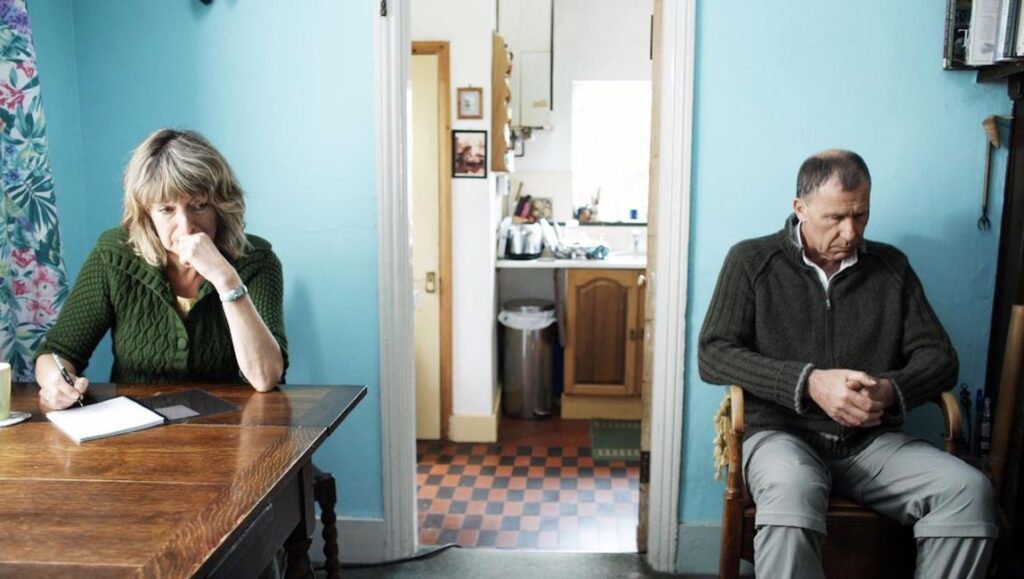Forget Monty Python — ten years ago, some friends and I stumbled across a British SNL-type television series called Jam, a mixed bag of some of the darkest and most off-kilter humor ever seen which continues to make me howl every time I watch it. Created by Chris Morris, director of the recent feature Four Lions, Jam is proof that the seeds for a film like Down Terrace had already been sown, as it traverses much of the same territory in tone and production. Director Ben Wheatley uses his television know-how from UK comedies Ideal and Wrong Door to create a wry dark comedy about a family of odd, low-level gangsters.
The film opens as Bill (Robert Hill) and his son Karl (Robin Hill) are released from jail on charges that apparently did not hold up in court. They’re eager to discover who ratted them out, but not until they’ve had a few beers and smoked a little weed. Bill’s wife Maggie (Julia Deakin) busies herself making tea and handling Karl, who has the ability to throw a fit at the drop of a hat. The three of them criticize and ridicule random associates who show up to the house, but there is no evidence that they are any different. Bill waxes poetically about transcendentalism, Karl reunites with his now very pregnant ex-girlfriend (much to his parents chagrin) and Maggie emerges as the placid ball-buster of the family and, to some extent, the larger network of the family. Meanwhile, the three of them independently start ‘cleaning house’ with droll brutality.
The handheld camerawork and the less-than-dynamic sound may be a form of necessity and comfort for Wheatley as he directs his first feature, but it also allows Down Terrace to masquerade its twisted intentions as a docile sitcom. Any attempt to pin down the genre is eventually discarded as you try to wrap your head around these absurd characters, who seem less like hardened criminals than two-bit thugs trying to convince everyone (including themselves) that they are hardened criminals. Wheatley’s whip-smart script is perfectly complemented by the ease with which the actors fill the shoes of their incongruous characters. It’s no surprise that the actors who play Bill and Karl are father and son and that Karl’s girlfriend is also his girlfriend off-screen. Despite their quirky nature, the family finds comfort in their swaying between clashing and cooperating.
Karl writes his manifest destiny in the family and surfaces as the unlikely star of the film. Hill, who also co-wrote the script with Wheatley, plays Karl as an unsympathetic man-child clumsily making his own rules. Evidence of coddling from his parents hilariously erupts and then disappears. Shortly after he reconnects with his girlfriend, they are up in his room having a heart-to-heart when Karl suggests they pull out some of the letters Maggie wrote to him in jail as a way to rekindle their affection. He spends five seconds looking for them in his cluttered room before he’s convinced that someone’s taken them. Rendered immobile, he stands upright and simply starts screaming, “Mum! Mum!” at the top of his lungs like a toddler who’s just lost his teddy bear. Just as you think he’s going to go physically ballistic, he looks over and calmly says, “Oh. Here they are.” The bizarre moment is over, but scenes like this set an erratic tone for the entire film.
Down Terrace chronicles two weeks of events and non-events surrounding Bill, Maggie, and Karl. The days are marked by onscreen intertitles that remind you how much or how little happens, usually in the close confines of the trio’s small flat. The story spirals downward pretty quickly and unfortunately, due to the cheeky nature of the film, it fails to have the effect that it should. Although Down Terrace never rises above the dark cynicism of comedic surrealism, it does so with such clever subtlety that the discarded weight of the body bags hardly matters.


Comments are closed.